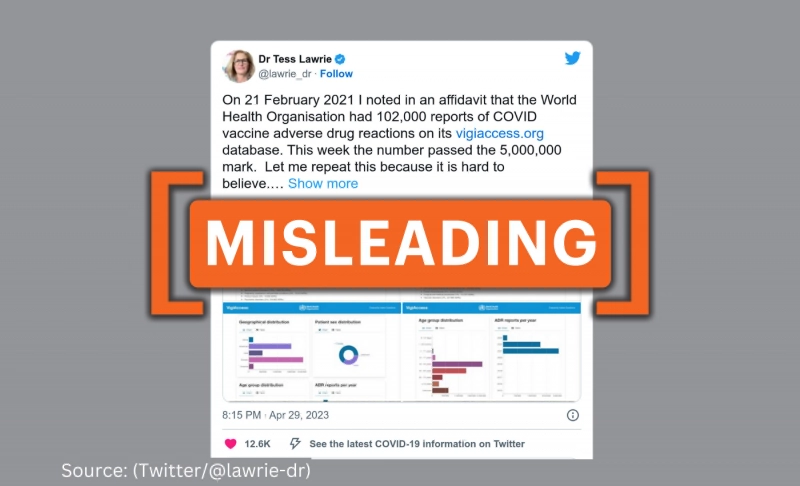By: Vivek J
May 25 2023
WHO's VigiAccess data used to misrepresent vaccine injuries and deaths

The Verdict Misleading
People's entries on vaccine adverse events or post-jab health issues on reporting platforms is not official data of confirmed cases.
Context
A Twitter post with over a million views claims that World Health Organization’s (WHO) VigiAccess database shows over five million suspected cases of COVID-19 vaccine injury. This post by Dr. Tess Lawrie says, “On 21 February 2021 I noted in an affidavit that the World Health Organisation had 102,000 reports of COVID vaccine adverse drug reactions on its database. This week the number passed the 5,000,000 mark. The exact number today is 5,026,245 people, including tens of thousands of deaths.”
This post was accompanied by screenshots from the VigiAccess database. The database contains information on possible vaccine injuries reported by people from around the world. However, the post misrepresents the fact that these entries are reported by people of health issues post-vaccination and not the data verified or labeled as suspected cases by the organization.
In Fact
The VigiAccess website clearly states: “VigiAccess is intended as a useful starting point for people who wish to understand more about the types of side effects that have been reported following the use of medicinal products. However, VigiAccess cannot be used to infer any confirmed link between a suspected side effect and any specific medicine.” It further noted that, “VigiAccess cannot be used to determine the likelihood of a side effect occurring.”
VigiAccess contains data collected and shared by members of the WHO Programme for International Drug Monitoring comprising over 170 countries and territories.
According to the U.S. Centers for Disease Control and Prevention (CDC), “Reports of adverse events to Vaccine Adverse Events Reporting System (VAERS) following vaccination, including deaths, do not necessarily mean that a vaccine caused a health problem.” It further noted that the preliminary deaths reported on VAERS were 19,000, which is 0.002 percent of the total people vaccinated in the U.S., and reiterated that vaccines were safe.
WHO’s page on Adverse Events Following Immunization (AEFI) says, “Severe reactions following immunization are extremely rare so several countries have joined forces to pool their AEFI data in a common global database. Experience shows that most severe AEFI are not true vaccine reactions; rather, they are coincidental occurrences of health events or the anxiety associated with receipt of a vaccine.” It also noted, “there is no perfect vaccine that is safe for everyone and that there will be some undesirable side effects which are mostly mild and clear up quickly.”
No governments or WHO has verified the cause of the adverse events reported in the respective countries’ databases or on VigiAccess. Therefore, one cannot say that the reported vaccine adverse effects or deaths were linked to the vaccines. U.K.’s yellow card reporting system also asks people to submit the suspected cases of side effects of vaccines. This would mean there has been no clinical oversight to determine the exact causes of the suspected side effects reported in such adverse event reporting platforms.
Lawrie is known for making unsubstantiated claims about COVID-19, its treatment, and the vaccines. Logically Facts has previously debunked claims by her. The VigiAccess data containing suspected cases of vaccine side effects and deaths are not representative of the inefficacy of COVID-19 vaccines.
The Verdict
The figures in WHO’s VigiAccess website are not the official data of confirmed cases of vaccine adverse events or deaths. This is just the data of what people uploaded into vaccine adverse event reporting systems and has not been clinically proven. Therefore, we have marked this claim as misleading.


